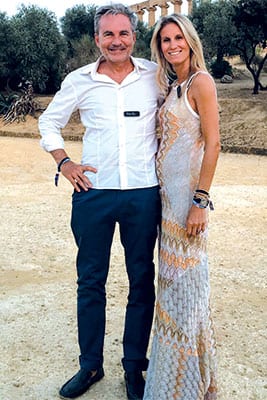Serial entrepreneur Martin Varsavsky has founded eight businesses, including two that garner valuations exceeding $1 billion, while many have been funded by big-name firms, such as Google Ventures, Microsoft and Sequoia Capital
It was during his college days, in 1984, that Martin Varsavsky (born 1960 in Buenos Aires) started his first business: Urban Capital Corporation, one of the early leaders of the loft residence movement in downtown Manhattan. This was soon followed, in 1986, by Medicorp Services, a Canadian biotech company pioneering in AIDS and PSA testing. His third business, Viatel Ltd., Martin’s first venture into the world of telecommunications, was founded in 1990. This company is best known for inventing callback and building the first pan European fibre optic network prior to liberalisation.
Varsavsky, who currently teaches entrepreneurship at Columbia University when not at home in Spain, credits a specific management practise for moving from one venture to the next. This Argentine entrepreneur accomplished his first venture in 1985, founding a New York real estate development company with a personal investment of $25,000. The returns that he and his team earned placed him in a position to retire at 27.
Martin tends to spend one year building up a company before seeking to reduce his personal involvement. He built Medicorp Sciences, a medical services company, after recruiting top scientists from his native Argentina, including Nobel Laureate Dr Cesar Milstein. When he tired of paying for long distance calls to speak with his family back in Buenos Aires, an idea hit Varsavsky that launched him into the world of fibre optics and internet connectivity.
First there was Viatel, a pan-European telecommunications company that grew to a value of $1.2 billion at the time he sold his shares. Then came Jazztel, a Spanish telecom company that eventually swelled to $3.6 billion, followed by Ya.com, a popular Spanish internet company that sold for over $500 million.
His résumé continues with his Googlebacked wifi-sharing company Fon, a German cloud computing venture that was ahead of its time, and Prelude Fertility, the start-up he founded to help couples have children. His experience begs the question: How is one founder capable of such repeated success?
For Varsavsky, as much as the aura of entrepreneurship might revolve around iconic founders like Elon Musk or Steve Jobs, a company’s success has more to do with the teams assembled by its founder.
People complain about email, but I am so happy the phone call era is over. At least on email there’s an order. With phone calls it was a case of the last person to call getting your attention first
He lost $50 million on the cloud computing company after it failed to live up to expectations.
Coming up with a compelling idea worth chasing is only step one. “The next step is to look at yourself in the mirror,” says Varsavsky. “I know it’s paradoxical because you see yourself, but you have to think, ‘What am I not?’ and, ‘What is it that my company doesn’t have?’. Once you have the parts of your company, it’s sort of like the missing person’s mirror.”
Varsavsky explains that he surrounded himself with workers who had traits that he lacked. His employees were patient, organised and methodical co-workers, which helped balance his more improvised style.
 “Without them I never would have built what I built,” Varsavsky says. “They’re amazing people who went on to be CEOs themselves.” Martin’s best-known ventures were founded during the last two decades. It was in 1998 that he launched Jazztel Telecomunicaciones (Jazztel), Spain’s second largest publicly traded telecom operator. In 1999 he founded Ya.com, Spain’s third largest website/DSL provider that includes the second largest Spanish language web agency, www.viajar.com. However, not all of MV´s companies were successful. In 2000 he set up Germany’s largest ASP, Einsteinet, but the company was sold in 2003 at no return to him or investors. He joined the supervisory board of publishing house Axel Springer in 2014.
“Without them I never would have built what I built,” Varsavsky says. “They’re amazing people who went on to be CEOs themselves.” Martin’s best-known ventures were founded during the last two decades. It was in 1998 that he launched Jazztel Telecomunicaciones (Jazztel), Spain’s second largest publicly traded telecom operator. In 1999 he founded Ya.com, Spain’s third largest website/DSL provider that includes the second largest Spanish language web agency, www.viajar.com. However, not all of MV´s companies were successful. In 2000 he set up Germany’s largest ASP, Einsteinet, but the company was sold in 2003 at no return to him or investors. He joined the supervisory board of publishing house Axel Springer in 2014.
Martin’s current venture is Fon. Founded in November 2005, it is a community-empowered company dedicated to building the world’s largest global WiFi network from the bottom up, spreading the power of WiFi around the world, with over seven million hot spots created by 2012. Fon attracted Skype, eBay and Google as partners and quickly became the world’s largest WiFi community.
He also engages in not-for-profit activities. Over the past 10 years he’s been teaching entrepreneurship at the Instituto de Empresa, Spain’s leading business school, while he also manages his own Varsavsky Foundation, best known as the founder of two large educational projects in Latin America – Educ.ar (Argentina) and EducarChile (Chile) – and the Safe Democracy Foundation.
Having served as Ambassador at Large of Argentina between 2001 and 2005, he is also on the Board of Trustees of the William Jefferson Clinton Foundation and is a board member of the Instituto de Empresa.
Varsavsky has written numerous articles on business and international relations that have been published in several international publications, including El Pais and Newsweek. He is also a frequent speaker at conferences around the world and an active blogger. He is the recipient of various acknowledgements and awards, among them the 1998 European Telecommunications Entrepreneur of the Year Award, ECTA’s European Entrepreneur of the Year for 1999, Global Leader for Tomorrow for 2000 according to the World Economic Forum in Davos, Spanish Entrepreneur of the Year 2000 and Columbia University’s 2004 Pickering Prize.

The idea for Prelude was actually born out of personal experience. Martin and Nina Varsavsky have six healthy children, with a seventh on the way
After moving to the United States from Spain in 2014, he received his BA from New York University, while he also earned an MA in International Affairs and an MA in Business Administration from Columbia University.
His latest start-up, Prelude Fertility, has a bold plan to turn the infertility industry on its head. Varsavsky isn’t just Prelude’s founder, because ‘Seven’, his upcoming child, will be the first “Prelude baby”!
Armed with $200 million, Prelude plans to take the technology of infertility – in vitro fertilisation (IVF) and egg freezing – and expand it aggressively into fertility, hoping to usher in a world where women’s decisions about family and career aren’t ruled by their biological clocks. Rather than catering primarily to women nearing the end of their childbearing years, who often find it harder to conceive, Prelude will target women aged from their late 20s to mid-30s, when it’s easier to harvest eggs and when those eggs are more likely to lead to healthy babies. As women increasingly delay childbirth – nearly one in three American women now has her first child after the age of 30 and nearly one in ten after 35 – Prelude sees itself as an insurance policy that gives women more control over their childbearing choices. “We’re about helping women and couples have healthy babies when they’re ready,” says Varsavsky.
Prelude Fertility aims to leverage existing infertility technologies, such as IVF and egg freezing, and take itself national in order to change the equation for women who are trying to balance starting a family and building a career. As Varsavsky puts it, “we’re about helping women and couples have healthy babies when they’re ready.”
The idea for Prelude was actually born out of personal experience. He and his wife, Nina, were struggling to start a family of their own. They conceived their first child together through IVF, then froze their eggs and sperm for future use and today have six healthy children and a seventh on the way.
In his spare time, Martin enjoys hanging out with his family, cycling, piloting, photography and sailing.
He is today the Executive Chairman and Founder of Prelude Fertility and CEO and Founder of Overture Life.